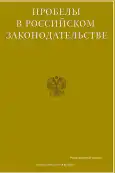To the Question of the Current State of the Methods of Implementation (Transformation) of International Legal Norms into the System of Russian Law
- Authors: Ilovaisky I.B.1, Turov G.S.2
-
Affiliations:
- Volgograd Institute of Management (branch) of Russian Presidential Academy of National Economy and Public Administration
- «Regional law company», LLC
- Issue: Vol 15, No 1 (2022)
- Pages: 145-152
- Section: Articles
- URL: https://journal-vniispk.ru/2072-3164/article/view/147432
- ID: 147432
Cite item
Abstract
Full Text
##article.viewOnOriginalSite##About the authors
Igor Borisovich Ilovaisky
Volgograd Institute of Management (branch) of Russian Presidential Academy of National Economy and Public Administration
Email: dominno@rambler.ru
Cand.Sci.(Law), Associate Professor, Associate professor of the department of civil law disciplines Volgograd, Russian Federation
George Sergeevich Turov
«Regional law company», LLC
Email: george.turov@mail.ru
Assistant of legal adviser Volgograd, Russian Federation
References
- Abdildina, D. B. On some features of the scientific examination of draft international treaties / D. B. Abdildina // Bulletin of the Institute of Legislation and Legal Information of the Republic of Kazakhstan. - № 5 (54). - 2018. - Pp. 161-166.
- Balkhaeva, S. B. Types of entry into force of international treaties of the Russian Federation / S. B. Balkhaeva // Journal of Russian Law. - № 8 (176). - 2011. - Pp. 56-64.
- Balkhaeva, S. B. Entry into force of international treaties as a result of accession / S. B. Balkhaeva // Journal of Russian Law. - № 7 (223). - 2015. - Pp. 131-141.
- Balkhaeva, S. B. Multilateral international treaties of the Russian Federation: features of entry into force / S. B. Balkhaeva // Journal of Russian Law. - № 10 (190). - 2012. - Pp. 82-89.
- Balkhaeva, S. B. Development of legislation on the entry into force of international treaties in the Soviet period / S. B. Balkhaeva // Bulletin of the Russian State Humanitarian University. Series «Economics. Control. Right». - № 3 (83). - 2012. - Pp. 193-201.
- Vdovin, V. A. Implementation of international legal norms in the criminal law of the Russian Federation (issues of the General part): dis. ... cand. legal Sciences: 12.00.08: defended 05.10.2006 / V. A. Vdovin. - Ulyanovsk, 2006. - 234 p.
- Vylegzhanin, A. N. International law. In 2 parts. Part 1: textbook for universities / A. N. Vylegzhanin [and others]; resp. ed. A. N. Vylegzhanin. - 4th edition, revised and enlarged. - Moscow: Yurayt Publishing House, 2022. - 329 p.
- Zheldybina, T. A. Implementation as a legal institution / T. A. Zheldybina // Bulletin of the Institute of Legislation and Legal Information of the Republic of Kazakhstan. - № 2 (34). - 2014. - Pp. 120-124.
- Kichenina, V. S., Fesenko, E. A. Implementation of the pacta sunt servanda principle in modern international legal relations / V. S. Kichenina, E. A. Fesenko // Legal Science. - № 1. - 2020. - Pp. 71-75.
- Kurashvili, A. Yu. The Federal Assembly of the Russian Federation in the process of concluding international treaties / A. Yu. Kurashvili // Law and Modern States. - № 3. - 2017. - Pp. 21-29.
- Lifshits, I. M. International financial law and the law of the European Union: interaction and mutual influence: monograph / I. M. Lifshits. - Moscow: Yustitsinform, 2020. - 548 p.
- Smaznov, D. A. Implementation of the norms of international law into the system of national law / D. A. Smaznov // Bulletin of a young scientist of the Kuzbass Institute: a collection of scientific articles. - Novokuznetsk: Kuzbass Institute of the Federal Penitentiary Service, 2019. - Pp. 48-51.
- Sosnov, N. A. Implementation of the norms of international law into the Russian legal system based on various methods of implementation / N. A. Sosnov // Issues of Russian justice. - 2021. - № 13. - Pp. 13-19.
- Sheverdyaev, S. N. Reflection of modern anti-corruption culture in Russian constitutional law: monograph / S. N. Sheverdyaev. - Moscow: Yustitsinform, 2020. - 320 p.
- Shutkin, M. V. Ratification as a way of expressing consent to the binding nature of international treaties in the Russian Federation / M. V. Shutkin // Innovations and investments. - № 7. - 2013. - Pp. 135-140.
Supplementary files








